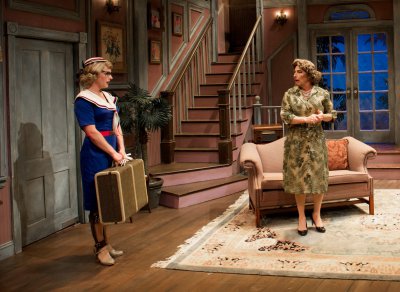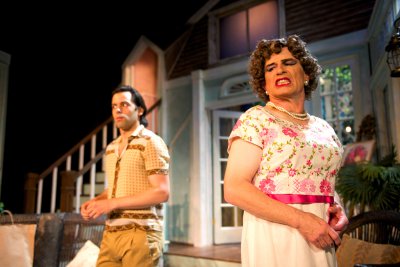Drop Dead Perfect
A hilarious new parody of 1940’s and 50’s Bette Davis and Joan Crawford melodramas allows Everett Quinton to sparkle as a Southern heiress with many scores to settle.
[avatar user=”Victor Gluck” size=”96″ align=”left” ] Victor Gluck, Editor-in-Chief[/avatar] Everett Quinton has found the ideal vehicle in the hilarious Drop Dead Perfect to revive the style of the Ridiculous Theatrical Company from which he originally found fame. Like the plays of the late Charles Ludlam plays, Erasmus Fenn’s Drop Dead Perfect parodies a specific genre using movie and television quotes and characters, situations lifted from famous melodramas, and sexual puns placed in new contexts. Here the new play is a satire of 1940’s and 50’s Bette Davis and Joan Crawford melodramas, with dollops of I Love Lucy which allows Quinton to sparkle as a Southern heiress with many scores to settle. Director Joe Brancato manages to keep the melodrama believable at all times and none of the quartet of actors goes beyond the histrionics inherent in the plot.
You will never be able to watch Tennessee Williams’ The Glass Menagerie the same way again as Drop Dead Perfect opens and closes with a narrator (the son of one of the main characters) who makes use of bits and pieces of Tom’s famous monologues for a new effect. In fact, the play set in 1950’s Key West has fun with choice bits of A Streetcar Named Desire and Orpheus Descending, better known as The Fugitive Kind. Quinton plays Idris Seabright, an eccentric wealthy spinster (is there any other kind?) whose ward, the repressed Vivien, a would-be sculptress of minimal original ideas and leg brace, is about to depart for an art scholarship in decadent Greenwich Village. Idris attempts to forbid her to leave, but Vivien has finally broken free of her domination.
Just as they are about to come to an impasse, Idris’ Cuban nephew Ricardo (who will not answer to Ricky but dances a mean tango) shows up with unspecified intentions. The son of Idris’ sister Lucy and Idris’ former boyfriend (also Ricardo), the young man looks so much like his father that Idris at first thinks that her former lover has come back to her. With her lawyer Phineas Fenn (the father of our erstwhile narrator) who continually drops in to bring Idris her new bottles of pills (of successively different colors – shades of Gaslight or Suspicion) as well as the new wills she requests, the atmosphere is set for a Gothic melodrama of jealousy and revenge. Each time you think you know where the play is going, there is a new unexpected twist that takes us in a new direction.

Jason Edward Cook and Everett Quinton in a scene from “Drop Dead Perfect” (Photo credit: John Quilty)
Part of the fun is identifying the quotes and references that come thick and fast. From I Love Lucy alone we have Vivien, Ethel (Idris’ off-stage neighbor) and the nephew at one point referred to as Ricky Ricardo, Desi Arnaz’s character in the sitcom. When both Idris and Vivien throw caution to the wind and express their passions, they suddenly appear in the red coiffure of Lucille Ball in her signature role. Ricardo loves quoting John Wayne’s famous line from Stagecoach but with a difference, “A man has to do what a man has to, to do what has to be done.” Idris Seabright’s name is actually taken from one of the pseudonyms of the 1950’s science fiction writer Margaret St. Clair, as is Wilton Hazzard, here the name of two of the producers. Is this a clue to how to discover the identity of the author “Erasmus Fenn,” whose bio in the program is a hoot?
Like Laura in The Glass Menagerie, the crippled Vivien speaks of “blue roses” while Idris “depends on the kindness of strangers,” Streetcar’s most famous line. Lawyer Fenn is one of those refined, polite Southern gentlemen that you meet throughout the work of Tennessee Williams. The sound design by William Neal is studded with musical quotes from famous movies from Alfred Hitchcock films to Bette Davis melodramas, as well as the ominous thunder that seems to come closer each time we hear it.+
Adorned in a series of attractive ensembles by Charlotte Palmer-Lane that grow increasingly sexy, Quinton has a field day depicting various moods as well as emotions which come simmering to the fore. Much of Idris’ dialogue is peppered with double entendres and Quinton makes the most of them. Quinton’s Idris could give both Bette Davis and Joan Crawford a run for their money as the spinster who seesaws between passion, jealousy and revenge.
Underplaying his role as the handsome Cuban with the thick Spanish accent and the knack for malapropisms in English, Jason Cruz holds his own against such a formidable scene stealer. Jason Edward Cook in discreet drag is also low key and amusing as the colorless Vivien who grows increasingly passionate as she is romanced by Ricardo, while under Timothy C. Goodwin’s calm exterior as Phineas Fenn beats a heart as jealous and as cunning as Quinton’s Idris. His narrator, the son of Phineas Fenn, is a true Williams character, Tom Wingfield in middle age.
James J. Fenton has created the sort of living room/entrance way/conservatory that reeks of classic Gothic melodrama. Lighting designer Ed McCarthy has fun with the lighting and moonlight effects, while Bobbie Zlotnik’s wigs become increasingly colorful and comic. Lorna Ventura is responsible for the witty dances that bring Ricardo and the female characters in close embrace.
Under Joe Brancato’s assured direction, Everett Quinton and cast bring back the heady days of the Ridiculous Theatrical Company’s classic parodies in the new Gothic satire, Drop Dead Perfect, a hilarious send up of 1940’s and 50’s movie and television melodramas.
Drop Dead Perfect (through October 11, 2015)
Penguin Rep Theatre
Theatre at St. Clements, 423 W. 46th Street, in Manhattan
For tickets, call 845-786-2073 or http://www.DropDeadPerfect.com
Running time: 85 minutes with no intermission
A hilarious new parody of 1940’s and 50’s Bette Davis and Joan Crawford melodramas allows Everett Quinton to sparkle as a Southern heiress with many scores to settle.








Leave a comment